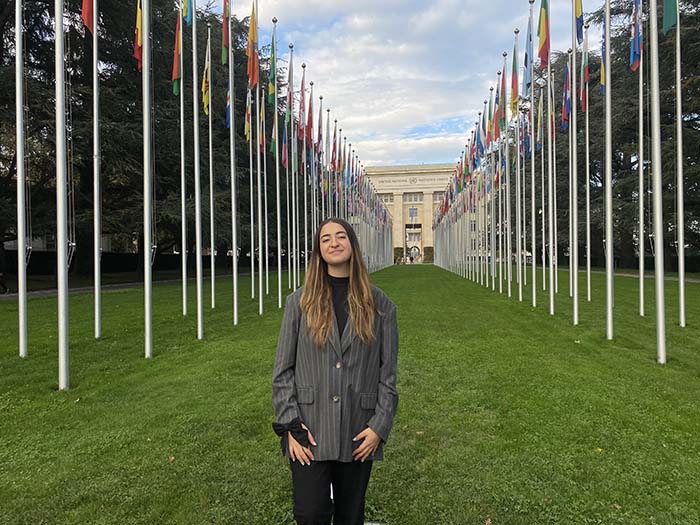
Gabriela Meschoulam, Global Studies ’26, Attends the UN’s Committee on the Elimination of Discrimination against Women
In October, Eugene Lang College’s Gabriela Meschoulam, Global Studies ’26, traveled to Geneva, Switzerland, to attend the 89th session of the United Nations’ Committee on the Elimination of Discrimination against Women (CEDAW). Meschoulam received this opportunity through an internship with Leticia Bonifaz Alfonzo, a CEDAW committee member from Mexico, where she has assisted on a variety of projects since last summer.
“Before attending CEDAW with Ms. Alfonzo, I provided her with support on her research projects, conference presentations, and other work since last summer. She’s given me several incredible opportunities, such as traveling with her to several universities in Mexico and attending CEDAW,” says Meschoulam.
The CEDAW committee consists of 23 experts on women’s rights from around the world and monitors implementation of the Convention on the Elimination of All Forms of Discrimination against Women. The CEDAW treaty was adopted by the UN General Assembly in 1979 and can be described as an international bill of rights for women around the world. Consisting of a preamble and 30 articles, it outlines what constitutes discrimination against women and sets up an agenda for national action to end it. In countries that have ratified the treaty, it has proved invaluable in opposing the effects of discrimination, which include violence, poverty, and lack of legal protections, along with the denial of inheritance, property rights, and access to credit.
For Meschoulam, who is pursuing minors in Gender Studies and Law and Social Change, the opportunity to experience CEDAW’s work in person was a dream come true. “I’ve always wanted to work at the United Nations. It’s my dream, my goal. I have been involved with the feminist movement in general, but also specifically in Mexico, and I believe my purpose in life is to work on something related to alleviating gender-based violence in Mexico.”
Meschoulam’s participation in the committee allowed her to learn about the real-world effects of its work and the complex interplay between countries’ delegations, NGOs, lawyers, and activists. “Every CEDAW expert, like Ms. Alfonzo, is assigned between two and five delegations they will question during committee sessions and two or three CEDAW articles to focus on. We, Mexico, were assigned the delegations from Chile, Cuba, New Zealand, Benin, and Canada, and we focused on Article III, Equality; Article 12, Health Care and Family Planning; Article 14, Rural Women and Minorities; and Education in general.”
“I supported Ms. Alfonzo with researching the recommendations that were given to those countries from prior CEDAW sessions and where those countries improved and what needs more improvement. When I got to Geneva, I realized there are many things that are not covered in the delegations’ reports and that you cannot find out online. During the convention, NGOs, lawyers, and others have an opportunity to report on these topics in their countries and give you a fuller understanding of these issues. This is where we’re able to make our research more complete, which will help us build recommendations for delegations to encourage them to make specific changes. You also see how everything is interconnected, so if there’s a problem with education, it will be connected with economic inequality, health, discrimination.”
Meschoulam credits the support from her Lang professors and a Civic Engagement and Social Justice grant from Lang for the success of her experience with CEDAW. “My professors in the Global Studies department were supportive of this opportunity and worked with me to make sure I’d still be able to complete my coursework. Also, my instructor of international law Karin Loevy gave me several tools to prepare for this, because nothing up to this point had really prepared me to suddenly go work at the UN.”
“I had the unbelievable opportunity to meet the chair of the committee, Ms. Ana Peláez Narváez, who is also the secretary general of the European Disability Forum. I had amazing conversations with her and experts from other countries like Lebanon and Japan. They all have so many different perspectives that they bring to the table,” says Meschoulam.